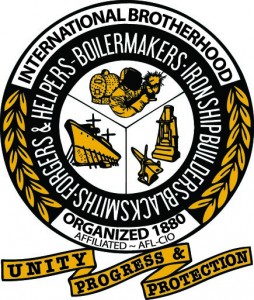Starting a Career as a Field Construction Boilermaker
Deciding to become a field construction boilermaker apprentice may be the single most important decision of your life. The following information will explain the job responsibilities, requirements, challenges, and experiences of a boilermaker.
Boilermaker work demands a high degree of technical skill and knowledge, a dedication to excellence, a willingness to study and complete on-the-job training, and an ability to travel from job site to job site to maintain employment.
Today’s field construction boilermaker apprentice is involved in more than just the construction of boilers. Apprentices are a vital part of construction project teams that erect pressure vessel assemblies and fabricate metal plate. You could be involved in the installation of a giant superheater section in a large utility boiler, the erection of a 750,000-gallon water storage tank, the placement of a nuclear power plant reactor dome, or the construction of components on a hydroelectric power station.

Typical tasks performed by a field construction boilermaker apprentice include:
- Loading and unloading materials
- Rigging materials for movement
- Directing crane operators
- Assembling/disassembling scaffolds and platforms
- Changing crane booms
- Inspecting and caring for rigging accessories and equipment
- Burning, gouging, and welding
- Removing and replacing tubes
- Interpreting blueprints
- Laying out components
- Erecting support steel beams and columns
- Using various welding machines
- Aligning and fitting components
Work performed by boilermakers requires high technical skill and a dedication to top performance.
Field construction work is by nature an ouside job which means exposure to all types of weather conditions, including extreme heat and cold.
Boilers, dams, power generation plants, storage tanks, and pressure vessels are usually of mammoth size; therefore, a major portion of boilermaker work is performed at great heights, often from 200 to 1000 feet above ground.
Field construction work is contract work: so, when the contract is completed, your job is ended. You may have to travel the territory of the local lodge and live away from home for long periods of time.
The size of the materials, tools, and equipment handled by boilermakers requires excellent physical strength and stamina.
To become a journeyman boilermaker, you must also complete a minimum 6000-hour apprenticeship program of on-the-job training, usually taking four years.
To become a journeyman boilermaker, you must also complete, after normal working hours, a four-year training program which includes self-study lessons, on-the-job modules, and classroom instruction when available.
Your response to the statements below should help you decide:
I am willing to do demanding and strenuous physical work.
I am not afraid of working at heights of 200 to 1000 feet above the ground.
I am willing to travel and live away from home for long periods of time to maintain employment.
I am willing to work in all types of adverse conditions.
I am willing to make a commitment to four years of on-the-job training.
I am willing to complete the self-study lessons and the on-the-job modules.
I understand that, based on employment conditions, I may be unemployed from time-to-time.
I am dedicated to performing a job to the best of my ability and in compliance with employer standards.
I am willing to attend classroom instruction when available in addition to my regular work hours.
If you answered yes to all nine statements, then you may be the kind of individual who could complete the boilermaker apprenticeship program. If you didn’t answer yes to all the statements, you may want to reconsider. If you desire more information, please contact the Area Coordinator at the address shown below. The coordinator can provide addtional information about the field construction boilermaker apprenticeship program, the application and selection process, and the benefits of starting a career as a field construction boilermaker.
Why should I become a Boilermaker?
Whether you’re a combo welder, fitter, ironworker, millwright or general laborer, consider joining our union Boilermaker workforce. The International Brotherhood of Boilermakers has been around for about 120 years, building a proven track record for success. And with welding, rigging and construction positions in high demand, as a union Boilermaker, you can earn top wages and enjoy excellent benefits, including:
- Full coverage health insurance
- Retirement savings
- Per diem (depending on jobsite)
- All equipment, hand-tools and consumables supplied
- A place to train and practice for jobs and certification testing
Boilermaker members also have access to benefits through our Boilermaker National Funds, scholarships, legal services, our vacation trust and our partner benefits at Union Plus.

